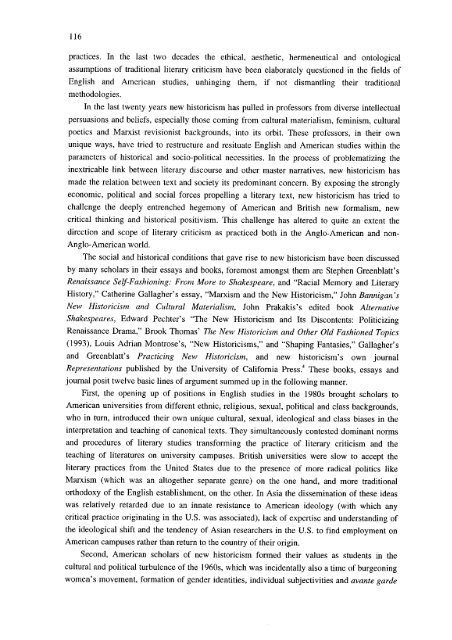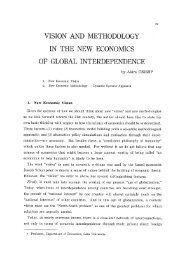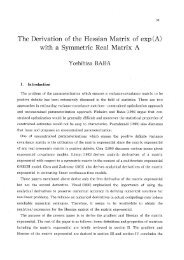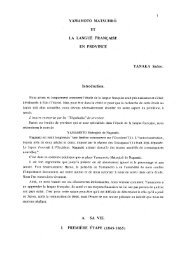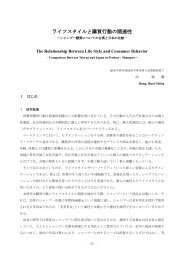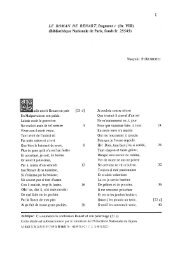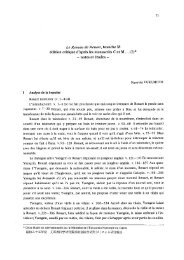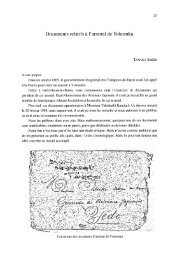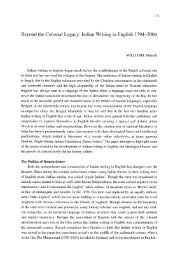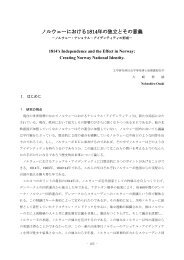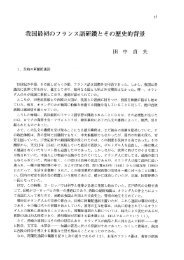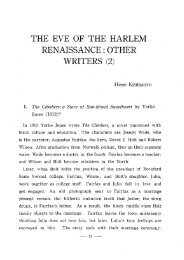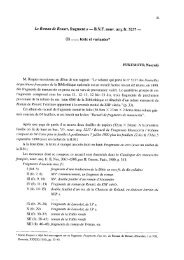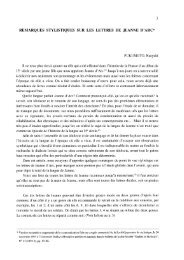New Historicism and Literary Studies - Soka University Repository
New Historicism and Literary Studies - Soka University Repository
New Historicism and Literary Studies - Soka University Repository
Create successful ePaper yourself
Turn your PDF publications into a flip-book with our unique Google optimized e-Paper software.
116<br />
practices. In the last two decades the ethical, aesthetic, hermeneutical <strong>and</strong> ontological<br />
assumptions of traditional literary criticism have been elaborately questioned in the fields of<br />
English <strong>and</strong> American studies, unhinging them, if not dismantling their traditional<br />
methodologies.<br />
In the last twenty years new historicism has pulled in professors from diverse intellectual<br />
persuasions <strong>and</strong> beliefs, especially those coming from cultural materialism, feminism, cultural<br />
poetics <strong>and</strong> Marxist revisionist backgrounds, into its orbit. These professors, in their own<br />
unique ways, have tried to restructure <strong>and</strong> resituate English <strong>and</strong> American studies within the<br />
parameters of historical <strong>and</strong> socio-political necessities. In the process of problematizing the<br />
inextricable link between literary discourse <strong>and</strong> other master narratives, new historicism has<br />
made the relation between text <strong>and</strong> society its predominant concern. By exposing the strongly<br />
economic, political <strong>and</strong> social forces propelling a literary text, new historicism has tried to<br />
challenge the deeply entrenched hegemony of American <strong>and</strong> British new formalism , new<br />
critical thinking <strong>and</strong> historical positivism. This challenge has altered to quite an extent the<br />
direction <strong>and</strong> scope of literary criticism as practiced both in the Anglo-American <strong>and</strong> non-<br />
Anglo-American world.<br />
The social <strong>and</strong> historical conditions that gave rise to new historicism have been discussed<br />
by many scholars in their essays <strong>and</strong> books, foremost amongst them are Stephen Greenblatt's<br />
Renaissance Self-Fashioning: From More to Shakespeare, <strong>and</strong> "Racial Memory <strong>and</strong> <strong>Literary</strong><br />
History," Catherine Gallagher's essay, "Marxism <strong>and</strong> the <strong>New</strong> <strong>Historicism</strong>," John Bannigan's<br />
<strong>New</strong> <strong>Historicism</strong> <strong>and</strong> Cultural Materialism, John Prakakis's edited book Alternative<br />
Shakespeares, Edward Pechter's "The <strong>New</strong> <strong>Historicism</strong> <strong>and</strong> Its Discontents: Politicizing<br />
Renaissance Drama," Brook Thomas' The <strong>New</strong> <strong>Historicism</strong> <strong>and</strong> Other Old Fashioned Topics<br />
(1993), Louis Adrian Montrose's, "<strong>New</strong> <strong>Historicism</strong>s," <strong>and</strong> "Shaping Fantasies," Gallagher's<br />
<strong>and</strong> Greenblatt's Practicing <strong>New</strong> <strong>Historicism</strong>, <strong>and</strong> new historicism's own journal<br />
Representations published by the <strong>University</strong> of California Press .4 These books, essays <strong>and</strong><br />
journal posit twelve basic lines of argument summed up in the following manner.<br />
First, the opening up of positions in English studies in the 1980s brought scholars to<br />
American universities from different ethnic, religious, sexual, political <strong>and</strong> class backgrounds ,<br />
who in turn, introduced their own unique cultural, sexual, ideological <strong>and</strong> class biases in the<br />
interpretation <strong>and</strong> teaching of canonical texts. They simultaneously contested dominant norms<br />
<strong>and</strong> procedures of literary studies transforming the practice of literary criticism <strong>and</strong> the<br />
teaching of literatures on university campuses. British universities were slow to accept the<br />
literary practices from the United States due to the presence of more radical politics like<br />
Marxism (which was an altogether separate genre) on the one h<strong>and</strong>, <strong>and</strong> more traditional<br />
orthodoxy of the English establishment, on the other. In Asia the dissemination of these ideas<br />
was relatively retarded due to an innate resistance to American ideology (with which any<br />
critical practice originating in the U.S. was associated), lack of expertise <strong>and</strong> underst<strong>and</strong>ing of<br />
the ideological shift <strong>and</strong> the tendency of Asian researchers in the U.S. to find employment on<br />
American campuses rather than return to the country of their origin.<br />
Second, American scholars of new historicism formed their values as students in the<br />
cultural <strong>and</strong> political turbulence of the 1960s, which was incidentally also a time of burgeoning<br />
women's movement, formation of gender identities, individual subjectivities <strong>and</strong> avante garde


